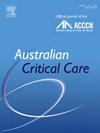在重症监护中增强护士的能力:日本多中心验证研究。
IF 2.6
3区 医学
Q2 CRITICAL CARE MEDICINE
引用次数: 0
摘要
背景:评估儿科重症监护室(PICU)家庭满意度的重要性日益得到认可。旨在评估家庭满意度的调查 "EMPATHIC-30"(重症监护中父母的权力)已在多个国家翻译并实施,但尚未在日本实施:本研究的目的是将 EMPATHIC-30 问卷翻译成日语并进行文化适应性调整和验证,同时确定以家庭为中心的护理满意度的潜在因素:方法:我们按照《良好实践原则》中列出的 10 个步骤对患者报告的结果测量进行了翻译和改编。日本的四家儿科 PICU 参与了验证研究,家长的入选标准是 PICU 住院时间超过 24 小时的患儿。信度由 Cronbach's α 测定,一致性有效性则通过相关分析与整体护理满意度量表进行检验。为了确定与日本 EMPATHIC-30 各领域相关的因素,进行了多变量线性回归建模:共有 163 名家长(平均年龄:31.9 ± 5.4 岁;81% 为母亲)参加了此次调查。日本 EMPATHIC-30 的五个领域显示出较高的可靠性(α = 0.87 至 0.97)和一致性有效性,与护士(r = 0.75)和医生(r = 0.76)的总体满意度有较高的相关性。多变量建模发现,择期入院、机械通气和有家庭成员在成人重症监护病房的经历的父母在所有五个领域的满意度得分都更高(P 结论:EMPATHIC-30 是一个非常有用的工具:日本的 EMPATHIC-30 问卷已证明具有足够的可靠性和有效性。我们还发现,择期入院、机械通气和家庭成员曾有过成人重症监护病房经历是所有满意度领域得分较高的因素。重症监护病房的临床医生需要认识到与重症患儿及其家人相关的伦理、文化和宗教因素。本文章由计算机程序翻译,如有差异,请以英文原文为准。
EMpowerment of PArents in THe Intensive Care: A multicentre validation study in Japan
Background
The importance of assessing family satisfaction in paediatric intensive care units (PICUs) is becoming increasingly recognised. The survey, EMpowerment of Parents in THe Intensive Care “EMPATHIC-30”, was designed to assess family satisfaction and has been translated and implemented in several countries but not yet in Japan.
Objectives
The objective of this study was to translate, culturally adapt, and validate the EMPATHIC-30 questionnaire in Japanese and to identify potential factors for family-centred care satisfaction.
Methods
We translated and adapted for patient-reported outcome measures via a 10-step process outlined by the Principles of Good Practice. Four paediatric PICUs in Japan participated in the validation study, and the parental enrolment criterion was a child with a PICU stay of >24 h. Reliability was measured by Cronbach's α, and congruent validity was tested with overall satisfaction-with-care scales by correlation analysis. Multivariate linear regression modelling was conducted to identify factors related to each domain of the Japanese EMPATHIC-30.
Results
A total of 163 parents (mean age: 31.9 ± 5.4 years; 81% were mothers) participated. The five domains of the Japanese EMPATHIC-30 showed high reliability (α = 0.87 to 0.97) and congruent validity, demonstrating high correlations with overall satisfaction in nurses (r = 0.75) and doctors (r = 0.76). Multivariate modelling found that elective admission, mechanical ventilation, and parents who had experience of a family member in an adult intensive care unit had higher satisfaction scores in all five domains (p < 0.05). Moreover, Buddhists assigned higher satisfaction scores in the Care and Treatment domain (p = 0.03).
Conclusions
The Japanese EMPATHIC-30 questionnaire has demonstrated adequate reliability and validity measures. We also identified that elective admission, mechanical ventilation, and having previous adult intensive care unit experience of a family member were factors in assigning higher scores for all satisfaction domains. PICU clinicians need to be cognisant of ethical, cultural, and religious factors relating to the critically ill child and their family.
求助全文
通过发布文献求助,成功后即可免费获取论文全文。
去求助
来源期刊

Australian Critical Care
NURSING-NURSING
CiteScore
4.90
自引率
9.10%
发文量
148
审稿时长
>12 weeks
期刊介绍:
Australian Critical Care is the official journal of the Australian College of Critical Care Nurses (ACCCN). It is a bi-monthly peer-reviewed journal, providing clinically relevant research, reviews and articles of interest to the critical care community. Australian Critical Care publishes peer-reviewed scholarly papers that report research findings, research-based reviews, discussion papers and commentaries which are of interest to an international readership of critical care practitioners, educators, administrators and researchers. Interprofessional articles are welcomed.
 求助内容:
求助内容: 应助结果提醒方式:
应助结果提醒方式:


